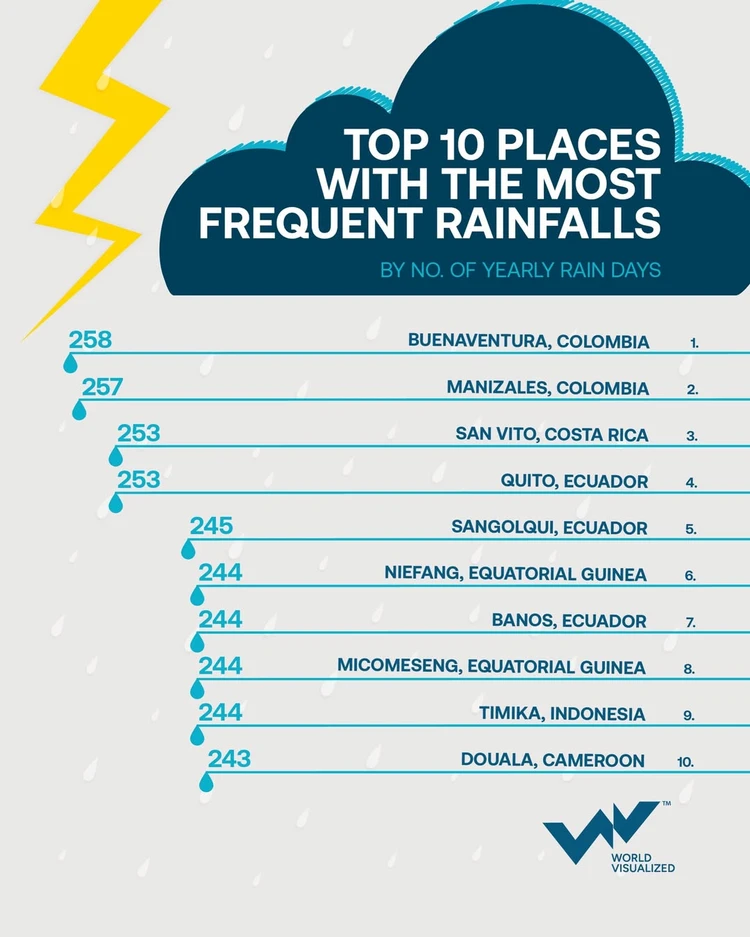Tag: environment
Rain shapes life for millions around the globe, but in some places, it barely ever stops. New climate data highlight the top 10 cities with the most frequent annual rainfall, measured by the number of rainy days per year.
The world has unearthed roughly 700 million metric tons of copper in total throughout history. That’s enough to fill a cube roughly 430 metres on each side, according to the U.S. Geological Survey (USGS).
"I love my food spicy" is a common phrase around the world, and there are different types of peppers that could help satisfy this desire.
From electric vehicles, wind turbines, smartphones, to satellites, rare earth elements are the bedrock of the technologies that define modern life.
Antarctica usually comes to mind when people think of penguins. That instinct is right, but it is only a part of the story. Penguins are much more geographically widespread, with significant populations across South America, Africa, and Oceania.
Long before gunpowder and mechanised armies transformed warfare, some of the most decisive battles in history were unexpectedly shaped by elephants.
The world’s oil wealth is highly concentrated as a relatively small group of countries controls the majority of known crude resources, shaping energy markets, geopolitics and long-term economic planning far beyond their borders.
China and the United States were reportedly the largest importers of Venezuelan crude in 2024.
At the beginning of 2026, Yemen’s war entered a more complicated phase as friction grew between the internationally recognised government and the Southern Transitional Council, which widened its reach across several southern areas.
Pineapples may seem like a simple tropical fruit, but behind the sweet slices on supermarket shelves lies a highly concentrated global export market shaped by agribusiness power, logistics hubs, and shifting trade dynamics.
Natural gas remains one of the most strategic energy resources worldwide, and the latest production rankings highlight how concentrated global supply has become.
In homes across the world, families are facing the same question every day of how to eat well when food prices keep rising, and life keeps getting busier.
Artificial intelligence may feel weightless in the sense that, in just a few clicks and an image appears, but the energy behind it tells a different story.
Australia and China remain the world’s top wool producers, according to recent figures from the International Wool Textile Organisation (IWTO). The data shows Australia leading with 356,745 tonnes of greasy wool, closely followed by China at 332,293 tonnes. Together, they account for nearly half of the world’s wool output.
Air pollution remains one of the world’s most pressing environmental and health threats. The latest IQAir 2024 World Air Quality Report paints a troubling picture, showing that millions of people still breathe air far above safe health limits.
The air quality ranking isn’t led by vast industrial economies but by tiny island territories with clean skies and windswept coastlines.
From the icy waters where the bowhead whale glides silently for two centuries, to the busy cities where modern human life expectancy has doubled in the last 70 years, the concept of ageing is fascinating.
According to the latest data from IQAir, a global leader in air quality monitoring, some of the world's major cities are experiencing the most severe levels of air pollution ever recorded.
The world is facing a plastic crisis, with millions of tons of plastic waste generated every year. Despite efforts to increase recycling rates, the reality is grim: only 9% of the world's plastic waste gets recycled, according to a report by the Organisation for Economic Co-operation and Development (OECD).
Recycling offers a pathway to sustainable resource management, helping to reduce waste and lessen environmental impact. According to IPEN research, each material—plastic, glass, paper, or aluminium—has its challenges and benefits.



















